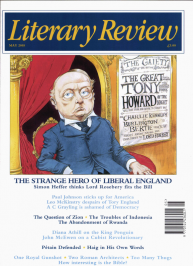A C Grayling
The Study of a Sacred Term
Set the People Free
By John Dunn
Atlantic Books 240pp £14.99
Reading an examination of democracy in the course of an election campaign is an instructive experience. The clumsy electoral mechanism operative in the United Kingdom allows the largest minority of those qualified to vote – which includes the citizens of many foreign states, including Eire – to put an oligarchy into power for four or five years. The system does this without providing a means of controlling the oligarchy’s behaviour in the interval between elections, if its crazy electoral arithmetic gives one party an absolute majority in the House of Commons. This matters because the Commons has, if it wishes to use it, an almost absolute discretion of power; only the delaying activities of judicial review and the House of Lords, and the recent advent of the Human Rights Act, have placed tentative constraints on it, all of which can easily be shrugged off by means of further Commons legislation or repeal.
The once vaunted liberties of the British subject (now fast being eroded by a succession of Home Secretaries intent on ‘protecting our freedom’ by destroying our liberties) are thus wholly at the sufferance of the party of the largest minority – everything from the freedom of the press to the

Sign Up to our newsletter
Receive free articles, highlights from the archive, news, details of prizes, and much more.@Lit_Review
Follow Literary Review on Twitter
Twitter Feed
The era of dollar dominance might be coming to an end. But if not the dollar, which currency will be the backbone of the global economic system?
@HowardJDavies weighs up the alternatives.
Howard Davies - Greenbacks Down, First Editions Up
Howard Davies: Greenbacks Down, First Editions Up - Our Dollar, Your Problem: An Insider’s View of Seven Turbulent...
literaryreview.co.uk
Johannes Gutenberg cut corners at every turn when putting together his bible. How, then, did his creation achieve such renown?
@JosephHone_ investigates.
Joseph Hone - Start the Presses!
Joseph Hone: Start the Presses! - Johannes Gutenberg: A Biography in Books by Eric Marshall White
literaryreview.co.uk
Convinced of her own brilliance, Gertrude Stein wished to be ‘as popular as Gilbert and Sullivan’ and laboured tirelessly to ensure that her celebrity would outlive her.
@sophieolive examines the real Stein.
Sophie Oliver - The Once & Future Genius
Sophie Oliver: The Once & Future Genius - Gertrude Stein: An Afterlife by Francesca Wade
literaryreview.co.uk